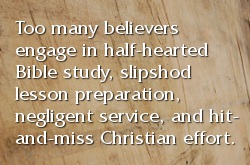 A sermon delivered at Calvary Baptist Church, Derby, Kansas. Reprinted with permission from As I See It, which is available free by writing to the editor at [email protected].
A sermon delivered at Calvary Baptist Church, Derby, Kansas. Reprinted with permission from As I See It, which is available free by writing to the editor at [email protected].
Tonight, I want us to study a single word in the NT: proskartereo. It looks and sounds like a perfect candidate for use in a Jeopardy category: “twelve-letter Greek words that are difficult to pronounce”!
This word caught my attention as I ran across it at various times over the years in my studies of the NT in Greek, and I thought its various occurrences and uses rather interesting.
It is a compound word, composed of the preposition pros, which means, “to, toward, in the direction of” and kartereo, a verb with the root idea of “to be strong, firm.” So it literally means “to be strong toward something or someone.” As used in the NT, the word carries the sense and meaning “to be devoted to, to be dedicated to, to focus on, to be committed to, to persist in” some purpose, object or person.
This word is used ten times in the Greek NT, six of which occur in Acts. I want to briefly note each of these uses.

 Read
Read  A sermon delivered at Calvary Baptist Church, Derby, Kansas. Reprinted with permission from
A sermon delivered at Calvary Baptist Church, Derby, Kansas. Reprinted with permission from  Reprinted with permission from
Reprinted with permission from 
Discussion